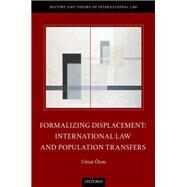Formalizing Displacement International Law and Population Transfers
, by Özsu, Umut- ISBN: 9780198717430 | 0198717431
- Cover: Hardcover
- Copyright: 2/18/2015
Large-scale population transfers are immensely disruptive, moving peoples from a region in which they have lived for a significant period of time to a new, different land that may be part of another country. The legal status of such transfers has shifted dramatically over time. This book situates population transfer within the broader history of international law by examining its emergence as a legally formalized mechanism of nation-building in the early twentieth century. The book's main focus is the 1922-34 compulsory exchange of minorities between Greece and Turkey, a crucially important endeavour whose legal dimensions remain under-scrutinized. The ambition of this exchange was enormous: over one million people were expelled from Turkey and over a quarter of a million people were expelled from Greece. Drawing upon historical sociology and economic history in addition to positive international law, the book interrogates received assumptions about international law's development by exploring the "semi-peripheral" context within which population transfers first occurred.
The book demonstrates that the Greek-Turkish population exchange was undertaken in response to a desire to "pacify" Greece and Turkey. With the support of the League of Nations, the population exchange reconfigured the demographic composition of Greece and Turkey with the aim of stabilizing a region that was regarded neither as European nor as non-European. The book shows the background to this event, assessing how minority protection developed into an instrument of intra-European governance during the course of the nineteenth century. It shows how population exchange emerged in the 1910s and 1920s as a radical alternative to minority protection, exemplified in the travaux preparatoires of the 1922-3 Conference of Lausanne, at which a peace settlement formalizing the Greek-Turkish exchange was concluded. It analyses in detail the Permanent Court of International Justice's 1925 advisory opinion in Exchange of Greek and Turkish Populations, with an eye to the wide-ranging disputes concerning the humanitarian ethos that pervaded much of the exchange process. The book argues that the Greek-Turkish population exchange laid the groundwork for a mechanism of nation-building that would later be deployed in a variety of different contexts, but whose precise status under international law would long remain contested.
The book demonstrates that the Greek-Turkish population exchange was undertaken in response to a desire to "pacify" Greece and Turkey. With the support of the League of Nations, the population exchange reconfigured the demographic composition of Greece and Turkey with the aim of stabilizing a region that was regarded neither as European nor as non-European. The book shows the background to this event, assessing how minority protection developed into an instrument of intra-European governance during the course of the nineteenth century. It shows how population exchange emerged in the 1910s and 1920s as a radical alternative to minority protection, exemplified in the travaux preparatoires of the 1922-3 Conference of Lausanne, at which a peace settlement formalizing the Greek-Turkish exchange was concluded. It analyses in detail the Permanent Court of International Justice's 1925 advisory opinion in Exchange of Greek and Turkish Populations, with an eye to the wide-ranging disputes concerning the humanitarian ethos that pervaded much of the exchange process. The book argues that the Greek-Turkish population exchange laid the groundwork for a mechanism of nation-building that would later be deployed in a variety of different contexts, but whose precise status under international law would long remain contested.







